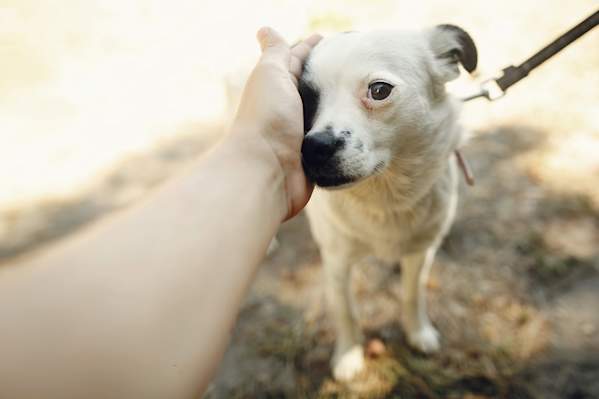Having a new dog is wonderful, but it can also be a lot of work, especially if they’re a rescue who has had a tough life or if they’re a particularly nervous or shy dog. Getting used to a new home and a new owner is exciting, but can also be a stressful experience for many pups. There’s good news, however — even the most scared or traumatized dogs can build rapport with their new owner over time. Read on for tips on the best ways to bond with your new dog and make them feel comfortable in their new home.
Read More: The Rescue Dog Checklist: Everything You Need For Your New Dog
Make Sure Your New Dog Feels Safe
The most important thing is to know that building trust will take time. You’ll also have to be ready to repeat the same soothing actions, such as speaking to them in a soft comforting voice, as much as you can. In a similar vein, make sure your body language doesn’t threaten them; if you bend over and reach out to pet them, for example, they might at first take that as an act of aggression. Instead of approaching your dog, wait and have them approach you instead — this, again, may take time, but is often effective in overcoming any fear or anxiety your pup may have.
It’s also helpful to let your dog feel like they have their own “safe place,” a crate or blanket they can go back to whenever they want, so they don’t feel trapped. It can take a while, but by taking these steps, your pet will eventually associate you with kindness instead of fear.
Start Training Them
Teaching your new dog new tricks is great way to build a bond with them. “Training exercises for both dogs and cats are really helpful in cementing the relationship between pet parents and new pets,” explains Dr. Wailani Sung. “It is also a way to strengthen the line of communication and make sure that our pets can clearly understand our intentions in certain situations.” Training also lets the dog know that you are “in charge,” which can also be a source of comfort to them in stressful situations because they’ll look to you to for safety and guidance.
Treat Them To Things They Love
It’s true that a way to a dog’s heart is often through their stomach. When you first get them home, try gently offering them an array of treats to see which ones they like best. Remember, the key thing here is to offer them treats — don’t shove treats down their throat or force them to eat anything.
There are other positive things you can do to make your dog more comfortable. “Lots of walks together can help create a ‘you and me’ type of bond with your pet,” Dr. Deirdre Frey, founder of the house call veterinary practice Vet At Your Door, explains.
“Lots of walks together can help create a ‘you and me’ type of bond with your pet.”
“Playing with them is good too, whether that’s playing with their favorite toy or having a game of fetch outside. It’s good for them to associate you with fun things as well as someone they take orders from.” As with all interaction with your dog, however, it’s also important to back off if they show any signs of fear or anxiety.
Keep Things Boring
When you get a new dog, it’s tempting to introduce them to all the exciting things they’ll have in their lives, such as other pups at the dog park or to your neighbors or even other family members. For the first few days or even weeks you have your dog, it’s best not to introduce new things into their regular daily routine, as anything new will make them more anxious and consequently slower to build rapport with you.

There are no easy fixes to building trust, and depending on the dog’s history (i.e., if they’ve had severe abuse or trauma in their past), you may even need the help of a behavioral therapist to develop a specialized plan to get your dog to a good headspace. With a lot of love and a lot of hard work, however, most dogs will improve, and they’ll have you to thank for their happier lives.
